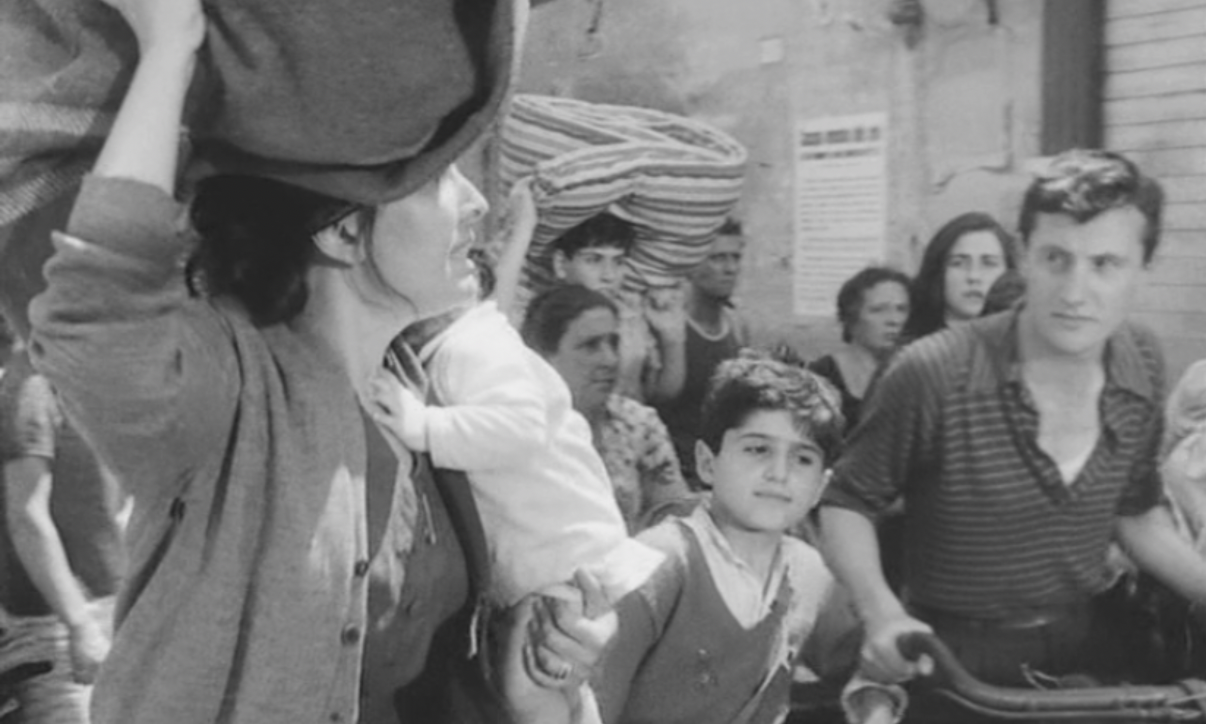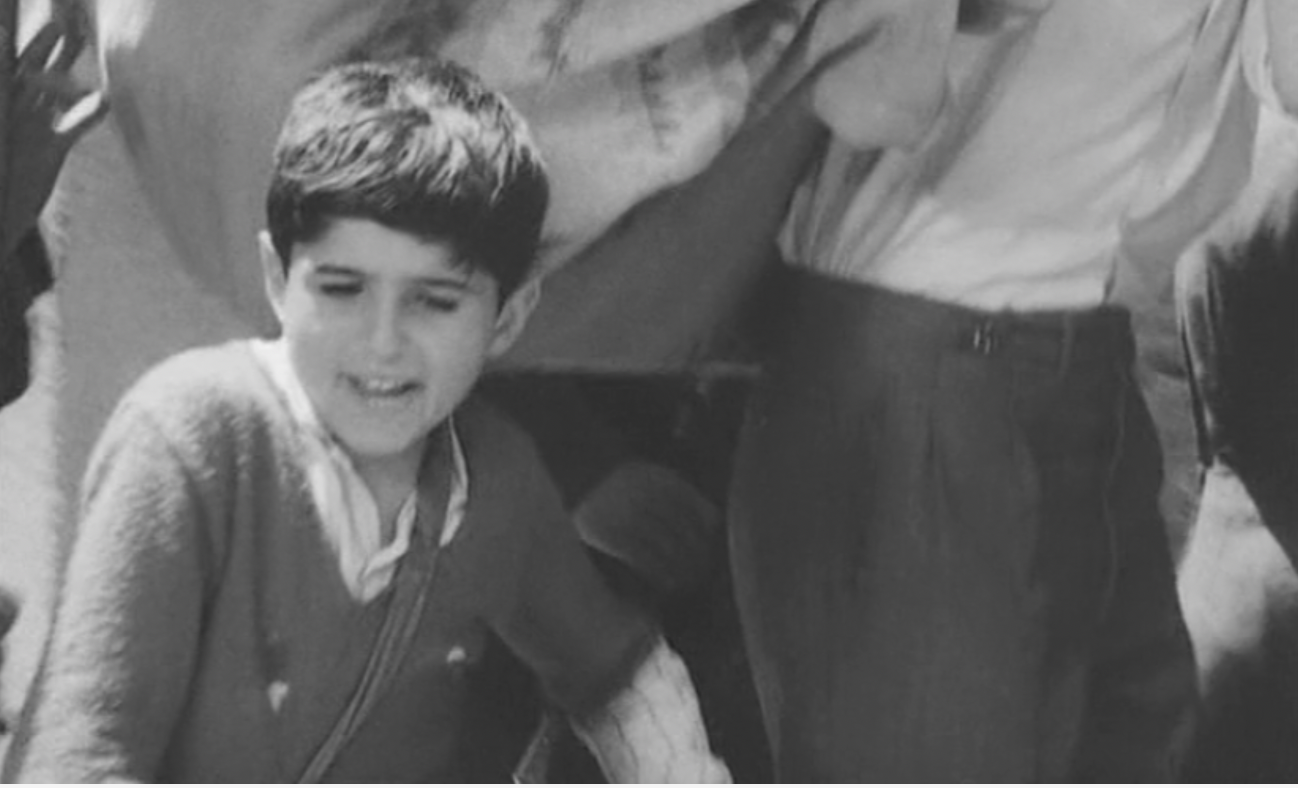Regia / Director: Nanni Loy, 1962
Un'auto attraversa la città annunciando con gli altoparlanti: "A partire da oggi è proclamato lo stato d'assedio e viene istituito il coprifuoco dalle ventuno alle sei del mattino". Veicoli militari tedeschi percorrono lentamente l'ampio viale, in una dimostrazione di forza.
A car passes through the city, announcing over loudspeakers, “Starting today a state of siege is proclaimed and curfew will be established from nine o’clock at night to six o’clock in the morning.” German military vehicles drive slowly down the broad avenue, in a show of force.
"Chiunque possieda armi deve consegnarle immediatamente ai commissariati di polizia. I trasgressori saranno fucilati".
Da un carro armato, un soldato tedesco scruta le finestre: non si vede anima viva.
“Everyone possessing arms must turn them in immediately at the police stations. Violators will be executed by firing squad.”
From a tank, a German soldier scans the windows: not a soul to be seen.
Più tardi, l'auto attraversa la città con un nuovo messaggio: "Attenzione, per ragioni militari, tutti gli abitanti degli edifici lungo la fascia costiera fino a 300 metri dal mare devono lasciare immediatamente ogni abitazione".
Later, the car winds through the city with a new message: “Attention, for military reasons, all inhabitants of the buildings along the coastline up to 300 yards from the sea must leave their dwellings immediately.”
"Chi sarà trovato nella zona da sgomberare sarà punito in base alle leggi di guerra tedesche".
Vediamo una processione sul lungomare, figure con valigie sulle spalle o sacchi riempiti con le loro cose che camminano faticosamente per trovare un posto dove vivere.
“Anyone found in the zone to be cleared will be punished according to German military laws.”
We see a procession along the seafront, figures with suitcases over their shoulders or sacks stuffed with their belongings, trudging off to find somewhere to live.
Alcuni trainano carretti pesantemente carichi. Sorvegliati da soldati, si riversano nell'entroterra.
Some pull heavily laden carts. Watched over by soldiers, they pour inland.
Appaiono pescatori scalzi che portano i loro remi. I soldati tedeschi, urlando, li costringono a unirsi alla folla di rifugiati.
Barefoot fishermen appear, carrying their oars. German soldiers, yelling, force them to join the crowd of refugees.
Tra la folla, una donna incinta fatica a camminare. Un uomo anziano viene portato fuori nel suo letto.
In the crowd, a pregnant woman struggles to walk. An old man is carried out on his bed.
Con un bambino in un braccio, mentre con l'altro braccio sorregge il pacco sulla testa, una donna chiede al figlio: "Dov'è Assuntina?" Si tratta di Concetta (Regina Bianchi).
"Non lo so, mamma. Era con te".
Concetta chiama disperata: "Assuntina, dove sei?" Chiede alle persone intorno a sé: "Scusate, avete visto una bambina con le trecce?"
With a baby in one arm, while the other arm steadies the package on her head, a woman asks her son, “Where is Assuntina?” This is Concetta.
“I don’t know, Mommy. She was with you.”
Concetta calls out desperately: “Assuntina, where are you?” She asks the people around her, “Excuse me, have you seen a little girl with braids?”
Dice al figlio Gennarino (Domenico Formato): "Disgraziato! Vai a cercarla!"
She tells her son, Gennarino, “Bad boy! Go look for her!”
Con il maglione pieno di buchi, Gennarino corre tra gli sfollati urlando: "Assuntina! Assuntina!"
His sweater full of holes, Gennarino runs amid the evacuees, yelling, “Assuntina! Assuntina!”
Una bambina con le trecce viene sollevata in alto e consegnata alla folla. "Mamma!" grida Gennarino. "È là!"
A little girl with braids is lifted up and handed through the crowd. “Mommy!” yells Gennarino. “She’s there!”
Con due bambini in braccio, Concetta dice ad Assuntina: "Mamma è qui. Non piangere!"
With two children in her arms, Concetta says to Assuntina, “Mommy’s here. Don’t cry!”
Lei ritrova la strada verso le sue cose, dove l'aspettano gli altri tre figli. Dice loro: "State vicino a me, avete capito?"
She finds her way back to her belongings, where her three other children wait. She tells them, “Stay close to me, understand?”
Ordina a Gennarino: "Conta sempre, tu!"
"Uno, due, tre, quattro, cinque. Ci siamo tutti".
She orders Gennarino: “You keep counting!”
“One, two, three, four, five. We’re all here.”
"Pronti, si parte!" dice allegramente. Sembra essere l'uomo di famiglia.
“Ready, off we go!” he says cheerfully. He seems to be the man of the family.
Seguiti da soldati tedeschi con i fucili pronti, i profughi continuano a muoversi. Gennarino si rivolge alla madre. "Ma dove andiamo?"
"Non lo so. Andiamo dove ci portano i piedi".
Herded by German soldiers with rifles at the ready, the refugees keep moving. Gennarino turns to his mother. “Where are we going?”
“I don’t know. We’ll go where our feet carry us.”
FINE PARTE 4
Here is Parte 5 of this cineracconto. Subscribe to receive a weekly email newsletter with links to all our new posts.






































